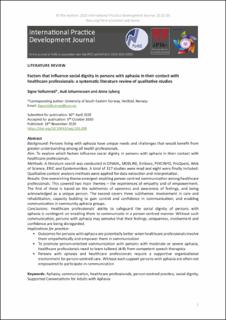| dc.contributor.author | Vallumrød, Signe | |
| dc.contributor.author | Johannessen, Aud | |
| dc.contributor.author | Lyberg, Anne Marit | |
| dc.date.accessioned | 2021-06-21T12:16:58Z | |
| dc.date.available | 2021-06-21T12:16:58Z | |
| dc.date.created | 2020-11-20T12:41:44Z | |
| dc.date.issued | 2020 | |
| dc.identifier.citation | Vallumrød, S., Johannessen, A., & Lyberg, A. (2020). Factors that influence social dignity in persons with aphasia in their contact with healthcare professionals: a systematic literature review of qualitative studies. International Practice Development Journal, 10(2). | en_US |
| dc.identifier.issn | 2046-9292 | |
| dc.identifier.uri | https://hdl.handle.net/11250/2760427 | |
| dc.description.abstract | Background: Persons living with aphasia have unique needs and challenges that would benefit from greater understanding among all health professionals. Aim: To explore which factors influence social dignity in persons with aphasia in their contact with healthcare professionals. Methods: A literature search was conducted in CINAHL, MEDLINE, Embase, PSYCINFO, ProQuest, Web of Science, ERIC and Epistemonikos. A total of 317 studies were read and eight were finally included. Qualitative content analysis methods were applied for data extraction and interpretation. Results: One overarching theme emerged: enabling person-centred communication among healthcare professionals. This covered two main themes – the experiences of empathy and of empowerment. The first of these is based on the subthemes of openness and awareness of feelings, and being acknowledged as a unique person. The second covers three subthemes: involvement in care and rehabilitation; capacity building to gain control and confidence in communication; and enabling communication in community aphasia groups. Conclusions: Healthcare professionals’ ability to safeguard the social dignity of persons with aphasia is contingent on enabling them to communicate in a person-centred manner. Without such communication, persons with aphasia may perceive that their feelings, uniqueness, involvement and confidence are being disregarded. Implications for practice: • Outcomes for persons with aphasia are potentially better when healthcare professionals involve them empathetically and empower them in communication • To promote person-oriented communication with persons with moderate or severe aphasia, healthcare professionals need to learn tailored skills from competent speech therapists • Persons with aphasia and healthcare professionals require a supportive organisational environment for person-centred care. Without such support persons with aphasia are often not empowered to participate in communication | en_US |
| dc.language.iso | eng | en_US |
| dc.rights | Navngivelse-Ikkekommersiell 4.0 Internasjonal | * |
| dc.rights.uri | http://creativecommons.org/licenses/by-nc/4.0/deed.no | * |
| dc.title | Factors that influence social dignity in persons with aphasia in their contact with healthcare professionals: a systematic literature review of qualitative studies | en_US |
| dc.type | Journal article | en_US |
| dc.type | Peer reviewed | en_US |
| dc.description.version | publishedVersion | en_US |
| dc.rights.holder | © The Author(s) 2020. | en_US |
| dc.source.volume | 10 | en_US |
| dc.source.journal | International Practice Development Journal | en_US |
| dc.source.issue | 2 | en_US |
| dc.identifier.doi | https://doi.org/10.19043/ipdj.102.009 | |
| dc.identifier.cristin | 1850386 | |
| cristin.ispublished | true | |
| cristin.fulltext | original | |
| cristin.qualitycode | 1 | |

